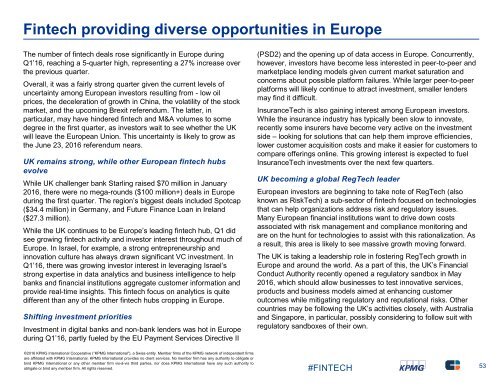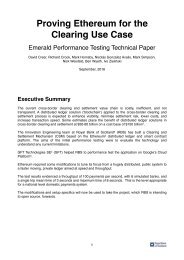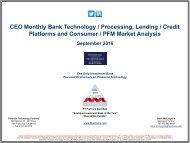of Fintech Q1 2016
25rBQCB
25rBQCB
You also want an ePaper? Increase the reach of your titles
YUMPU automatically turns print PDFs into web optimized ePapers that Google loves.
<strong>Fintech</strong> providing diverse opportunities in Europe<br />
The number <strong>of</strong> fintech deals rose significantly in Europe during<br />
<strong>Q1</strong>’16, reaching a 5-quarter high, representing a 27% increase over<br />
the previous quarter.<br />
Overall, it was a fairly strong quarter given the current levels <strong>of</strong><br />
uncertainty among European investors resulting from - low oil<br />
prices, the deceleration <strong>of</strong> growth in China, the volatility <strong>of</strong> the stock<br />
market, and the upcoming Brexit referendum. The latter, in<br />
particular, may have hindered fintech and M&A volumes to some<br />
degree in the first quarter, as investors wait to see whether the UK<br />
will leave the European Union. This uncertainty is likely to grow as<br />
the June 23, <strong>2016</strong> referendum nears.<br />
UK remains strong, while other European fintech hubs<br />
evolve<br />
While UK challenger bank Starling raised $70 million in January<br />
<strong>2016</strong>, there were no mega-rounds ($100 million+) deals in Europe<br />
during the first quarter. The region’s biggest deals included Spotcap<br />
($34.4 million) in Germany, and Future Finance Loan in Ireland<br />
($27.3 million).<br />
While the UK continues to be Europe’s leading fintech hub, <strong>Q1</strong> did<br />
see growing fintech activity and investor interest throughout much <strong>of</strong><br />
Europe. In Israel, for example, a strong entrepreneurship and<br />
innovation culture has always drawn significant VC investment. In<br />
<strong>Q1</strong>’16, there was growing investor interest in leveraging Israel’s<br />
strong expertise in data analytics and business intelligence to help<br />
banks and financial institutions aggregate customer information and<br />
provide real-time insights. This fintech focus on analytics is quite<br />
different than any <strong>of</strong> the other fintech hubs cropping in Europe.<br />
Shifting investment priorities<br />
Investment in digital banks and non-bank lenders was hot in Europe<br />
during <strong>Q1</strong>’16, partly fueled by the EU Payment Services Directive II<br />
(PSD2) and the opening up <strong>of</strong> data access in Europe. Concurrently,<br />
however, investors have become less interested in peer-to-peer and<br />
marketplace lending models given current market saturation and<br />
concerns about possible platform failures. While larger peer-to-peer<br />
platforms will likely continue to attract investment, smaller lenders<br />
may find it difficult.<br />
InsuranceTech is also gaining interest among European investors.<br />
While the insurance industry has typically been slow to innovate,<br />
recently some insurers have become very active on the investment<br />
side – looking for solutions that can help them improve efficiencies,<br />
lower customer acquisition costs and make it easier for customers to<br />
compare <strong>of</strong>ferings online. This growing interest is expected to fuel<br />
InsuranceTech investments over the next few quarters.<br />
UK becoming a global RegTech leader<br />
European investors are beginning to take note <strong>of</strong> RegTech (also<br />
known as RiskTech) a sub-sector <strong>of</strong> fintech focused on technologies<br />
that can help organizations address risk and regulatory issues.<br />
Many European financial institutions want to drive down costs<br />
associated with risk management and compliance monitoring and<br />
are on the hunt for technologies to assist with this rationalization. As<br />
a result, this area is likely to see massive growth moving forward.<br />
The UK is taking a leadership role in fostering RegTech growth in<br />
Europe and around the world. As a part <strong>of</strong> this, the UK’s Financial<br />
Conduct Authority recently opened a regulatory sandbox in May<br />
<strong>2016</strong>, which should allow businesses to test innovative services,<br />
products and business models aimed at enhancing customer<br />
outcomes while mitigating regulatory and reputational risks. Other<br />
countries may be following the UK’s activities closely, with Australia<br />
and Singapore, in particular, possibly considering to follow suit with<br />
regulatory sandboxes <strong>of</strong> their own.<br />
©<strong>2016</strong> KPMG International Cooperative (“KPMG International”), a Swiss entity. Member firms <strong>of</strong> the KPMG network <strong>of</strong> independent firms<br />
are affiliated with KPMG International. KPMG International provides no client services. No member firm has any authority to obligate or<br />
bind KPMG International or any other member firm vis-à-vis third parties, nor does KPMG International have any such authority to<br />
obligate or bind any member firm. All rights reserved.<br />
#FINTECH<br />
53









